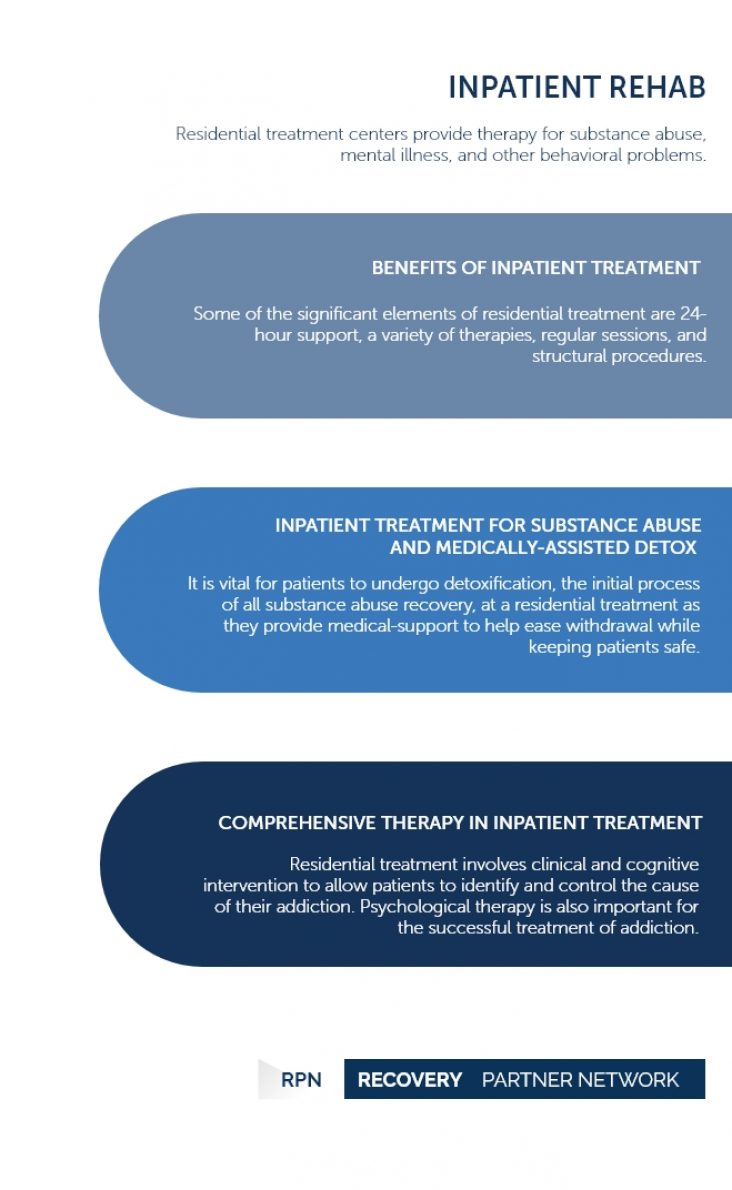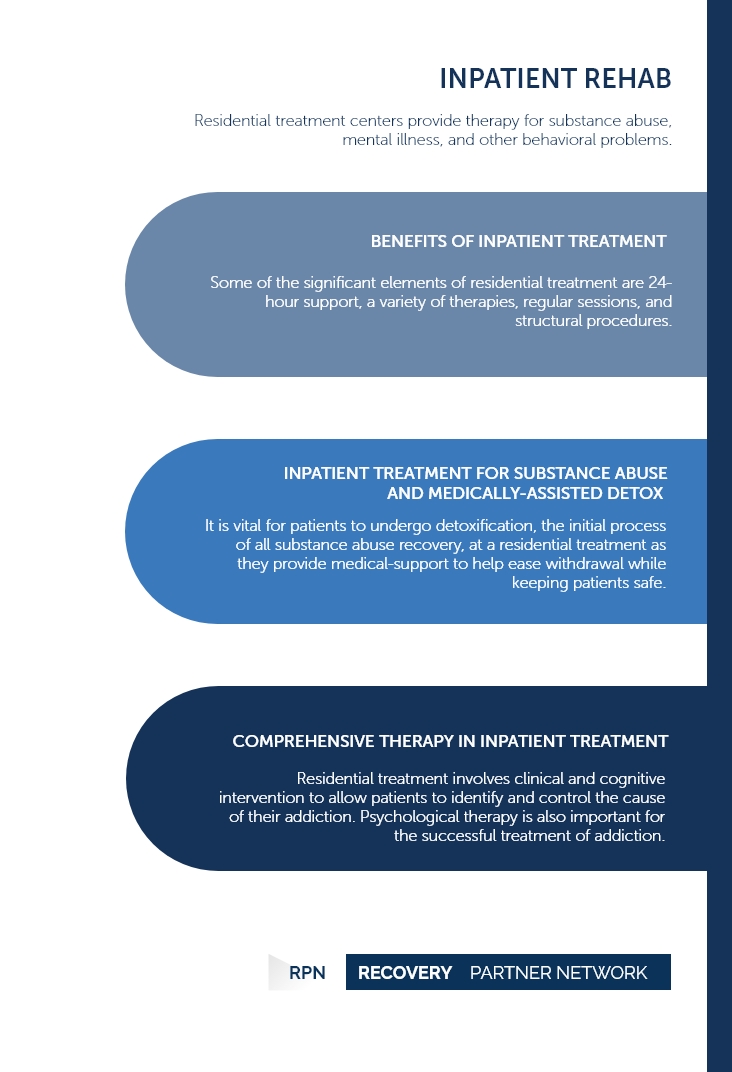Residential treatment centers provide therapy for substance abuse, mental illness, and other behavioral problems.
Residential treatment center
Inpatient rehab | Table of Contents
What is Inpatient Treatment?
Intensive therapeutic services offered by residential care facilities enable individuals seeking treatment to leave their homes and live in a recovery facility during that period. Such centers are in operation to provide effective, safe, and evidence-based care for youth and adults who have encountered profound negative problems relating to drug misuse, addictions, co-occurring disorders, and eating disorders. In residential treatment, patients have the opportunity to address physical and psychological dependence and addiction under the supervision and guidance of certified healthcare professionals.
FAQ
- What is inpatient treatment?
- What is the difference between inpatient and outpatient?
- Why is inpatient care so expensive?
Inpatient treatment is a residential facility that provides a safe, secure, and controlled environment to overcome addiction. These treatment centers provide around the clock medical care and support to their patients.
While inpatient treatment centers provide residential facilities with a highly structured and controlled environment, outpatient centers allow patients to return home after a few hours of treatment.
Inpatient care is more expensive than outpatient care because they use more hospital resources, provide residential facilities, and health care professionals around the clock.
Why Choose Inpatient Treatment?
While individuals enroll in residential treatment for various issues, there are certain challenges that almost always require a residential level of care, such as:
- Extreme mental health issues
- Eating Disorder
- Alcohol addiction and drug addiction
Beyond the diagnosis of a disorder, other factors may also contribute to the use of residential care, including:
- The ineffectiveness of other treatment options.
- Lack of sufficient support at home or within the community.
- Safety concerns such as the high risk of self-harm.
- Diagnostic ambiguity
When healthcare providers are unable to determine a person’s condition, residential care may be recommended. In a residential treatment center, psychologists and physicians can better understand the patient’s symptoms, behaviors, and emotions and provide the necessary care required.
FAQ
Residential treatment centers provide a highly intensive and structured treatment program for patients with severe addiction. These programs provide residential facilities where patients are supervised and monitored by trained staff.
Inpatient programs generally last around 28 days to 6 months.
Benefits of Inpatient Treatment
Irrespective of the distinctions, there are significant elements that, in general, contribute to the effectiveness of residential treatment.
- 24-hour support
- Distance from the patients previous life
- Different types of therapy
- Regular sessions
- Structure and procedure
The around the clock monitoring and support available in all residential rehab centers is the primary reason for its high success rate in addiction treatment. While it may sometimes feel like an invasion of privacy, this method helps patients progress, identify struggles, and prevent relapses to a greater extent.
Being removed from negative environments and triggers, including places and people, can help patients gain clarity and understanding and help them make positive changes to their lives.
Residential treatment centers offer a wide range of therapeutic intervention options. Many residential rehab facilities take on board a holistic perspective to ensure that patients heal not just physically but emotionally as well. Some common treatment elements include trauma therapy, art therapy, equine therapy, and different experiential therapy forms.
Residential treatment centers provide their patients with regular and mandatory counseling sessions while also providing a variety of therapies to choose from. Being given access to a doctor on a daily basis will significantly help patients recover and build a positive therapeutic alliance with their physicians and therapists.
Residential treatment facilities usually function under a structured schedule. Patients must wake up and go to sleep at the same time, engage in household tasks and responsibilities, have regular mental wellbeing and medical appointments, and have time available for exercise and leisure. This helps bring stability and structure to a patient’s life and significantly help them in their recovery process.
How to Choose a Inpatient Treatment Center?
Each state has its own licensing requirements for treatment centers. Although the qualifications to be licensed may vary slightly, each residential treatment center must be licensed. In addition to licensing, many RTCs seek additional accreditation, which requires them to go through a series of evaluations to meet certain standards. An RTC that is accredited and licensed generally provide an enhanced quality of care.
A comprehensive residential rehab center function under a collaborative partnership with area hospitals and emergency care services. Whether the patient has an accident, is engaged in self-harm, or requires additional medical support, it is vital that the treatment facilities have these resources readily available.
Residential treatment centers offer their patients access to aftercare programs so that they could maintain their recovery and decrease their chances of a relapse.
It is essential for every RTC to have properly trained and (in some cases) certified staff available in sufficient numbers. The number of patients may vary from day to day, as some patients may be admitted on any given day, while others may be discharged. Therefore, there must be sufficient staff to provide adequate support to any number of patients (depending on the maximum capacity of the RTC.)
Inpatient Treatment for Substance Abuse and Medically-Assisted Detox
The initial process of all substance abuse recovery involves detoxification. This process involves the patient flushing out the addictive substance from their body while experiencing withdrawal symptoms, that can often be difficult and sometimes dangerous. Hence, it is vital that patients undergo detoxification at a residential treatment as they provide medical-support to help ease withdrawal while keeping patients safe.
Withdrawal typically entails at least some pain, which can be minimized by several medications prescribed by physicians and other medical professionals. During certain addiction treatments such as alcohol addiction and opioid addiction, medications are vital to minimize the harmful and life-threatening consequences of withdrawals.
Comprehensive Therapy in Inpatient Treatment
Other aspects of recovery include clinical and cognitive intervention that allows the individual to identify and control the cause of their addiction. This can be especially useful for patients with a dual diagnosis or co-occurring disorder. Patients with co-occurring conditions must receive treatment concurrently for both substance use disorder and mental health issues.
Psychological therapy is also important for the successful treatment of addiction. Although most treatments involve certain types of group therapy, certain gains are also made through individual therapy. Residential treatment centers provide their patients’ insight into their addiction. Educating patients about their addiction and its impact on their lives and the lives of those close to them can help them see things from a different perspective and encourage them to recover. These new insights will also help patients acknowledge and understand their triggers and help them make positive changes to their lives, and provide them with the necessary tools to battle their cravings. Residential treatment centers educate their patients with relapse prevention methods to help them battle this disease in the outside world.
FAQ
- What are the services provided by inpatient treatment?
- Are you allowed to have a phone in a residential treatment center?
Inpatient treatment centers provide medically assisted detoxification programs, individual/group therapies, support groups, and mental health treatment.
Most treatment centers would not allow their patients to have cell phones. It is something you would want to clarify before you check-in for treatment.
Alternative Treatment Options
- Outpatient Treatment
- Intensive Outpatient Programs (IOPs)
- Partial Hospitalization Services (PHPs)
- Hospitalization
Outpatient facilities can apply to various services or recovery programs that provide individual counseling, support groups, or group therapy. These services may be provided at a community mental health facility or a private clinic. Outpatient rehab services are considered the lowest level of care and are best suited for patients with a mild addiction or for patients who complete an inpatient treatment program. Outpatient treatment services are generally scheduled at the patient’s requirements.
IOPs are similar to partial hospitalization services, but with a less intensive and limited period of treatment. Intensive outpatient programs are ideal for patients with mental health problems and severe drug abuse. They are also suitable for individuals who require additional assistance than what is offered in a general outpatient setting.
Also known as day-facilities, partial hospitalization services are rehabilitation programs in which patients undergo at least six hours a day of care. This level of care is a part of a step-down or transitional program for patients leaving a clinical hospital or residential treatment plan.
Also referred to as inpatient acute care, hospitalization is meant for those who require 24-hour treatment and access to a physician. Hospitalization is also for patients who require psychological treatment and are at risk of hurting themselves or others. Hospitalization is used in “crisis” situations to stabilize the patient (generally within a few days).
Recovery Partner Network
We aim to educate and empower. If you feel our library of resources does not cover your specific need, reach out to us, and we would be happy to help.
STATISTICS
© Copyright 2026


